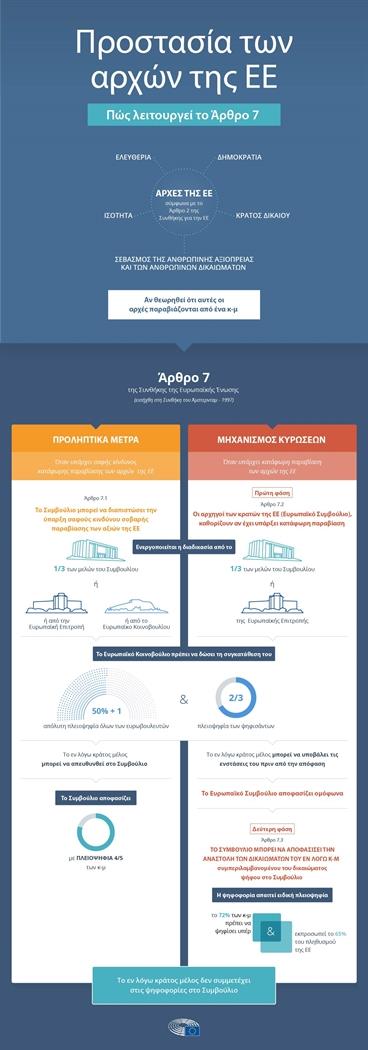The EU has a legal mechanism to respond to countries, who are not respecting EU values. What is Article 7 of the Treaty of the EU? Article 2 of the Treaty on European Union mentions respect for the rule of law as one of the values the EU is founded on. A breach of EU values justifies a reaction by the Union and this is what the procedure under Article 7 of the Treaty on European Union aims to achieve.
Hungary
On 12 September, MEPs decided to ask the Council to determine whether Hungary is at risk of breaching the EU´s founding values. This action was in accordance with Article 7 of the Treaty on the European Union. MEPs raised a number of concerns about the functioning of the country’s institutions which are not in line with EU values such as the undemocratic functioning of the electoral system, independence of the judiciary and the respect for citizens’ rights and freedoms.
Article 7
The Article 7 procedure for protecting EU values was introduced in 1997. It includes two mechanisms:
a. Preventive measures, if there is a clear risk of a breach of EU values; and sanctions, if such a breach has already occurred.
b. Possible sanctions against the EU country concerned are not clearly defined in EU treaties, but might include suspending voting rights in the Council and the European Council.
For both mechanisms, the final decision needs to be taken by representatives of member states in the Council, but the thresholds to reach a decision are different.
For the preventive mechanism, a decision in the Council requires a majority of four fifths of member states, whereas a determination on the existence of a breach requires unanimity among EU heads of state and government.
The EU country concerned does not take part in either vote.
Check out Europarl’s infographic for all the details.

Parliament’s role
Under Article 7, Parliament is one of the institutions that can initiate the preventive mechanism by calling on the Council to determine that there is a risk of a breach of EU values. The plenary vote on Hungary was the first time that Parliament took the initiative of recommending that the mechanism should be triggered.
To be adopted, the proposal needs to receive the support of an absolute majority of MEPs, namely 376, and two thirds of the MEPs who take part in the vote.
Poland
MEPs supported in March a similar Commission proposal that sought to activate the preventive mechanism in the case of Poland. In that case, Parliament backed the concerns of the Commission about the separation of powers, the independence of the judiciary and fundamental rights in the country.
MEPs urged EU governments to swiftly determine whether Poland was at risk of a serious breach of EU values and if so, to propose solutions. The Council held a hearing on the matter in June with Poland’s representatives explaining their position.
Edited by: Bouli Hadjioannou
















